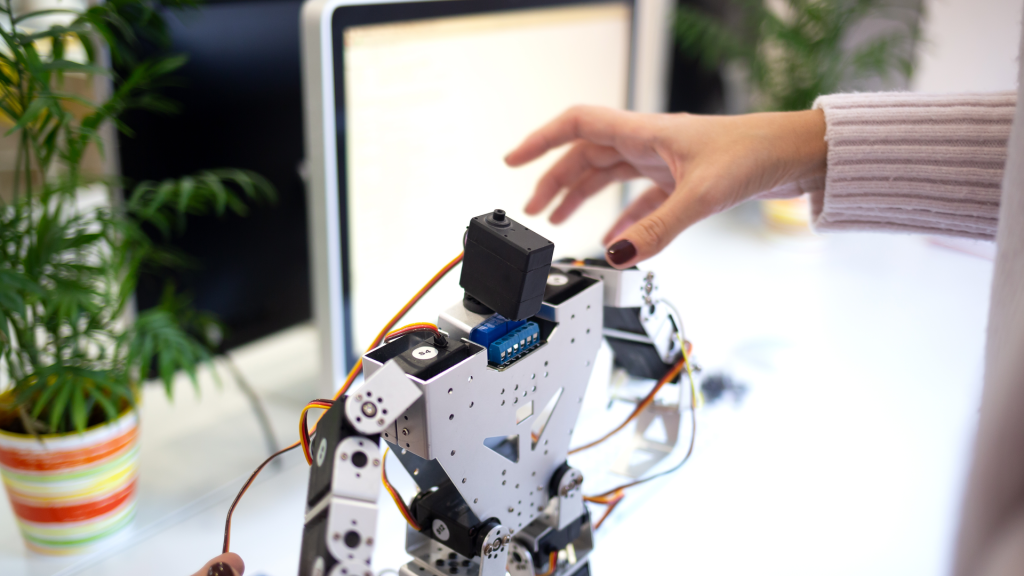
Robohub.org
Can charismatic robots help teams be more creative?

Image/Shutterstock.com
By Angharad Brewer Gillham, Frontiers science writer
Increasingly, social robots are being used for support in educational contexts. But does the sound of a social robot affect how well they perform, especially when dealing with teams of humans? Teamwork is a key factor in human creativity, boosting collaboration and new ideas. Danish scientists set out to understand whether robots using a voice designed to sound charismatic would be more successful as team creativity facilitators.
“We had a robot instruct teams of students in a creativity task. The robot either used a confident, passionate — ie charismatic — tone of voice or a normal, matter-of-fact tone of voice,” said Dr Kerstin Fischer of the University of Southern Denmark, corresponding author of the study in Frontiers in Communication. “We found that when the robot spoke in a charismatic speaking style, students’ ideas were more original and more elaborate.”
Can a robot be charismatic?
We know that social robots acting as facilitators can boost creativity, and that the success of facilitators is at least partly dependent on charisma: people respond to charismatic speech by becoming more confident and engaged. Fischer and her colleagues aimed to see if this effect could be reproduced with the voices of social robots by using a text-to-speech function engineered for characteristics associated with charismatic speaking, such as a specific pitch range and way of stressing words. Two voices were developed, one charismatic and one less expressive, based on a range of parameters which correlate with perceived speaker charisma.
The scientists recruited five classes of university students, all taking courses which included an element of team creativity. The students were told that they were testing a creativity workshop, which involved brainstorming ideas based on images and then using those ideas to come up with a new chocolate product. The workshop was led by videos of a robot speaking: introducing the task, reassuring the teams of students that there were no bad ideas, and then congratulating them for completing the task and asking them to fill out a self-evaluation questionnaire. The questionnaire evaluated the robot’s performance, the students’ own views on how their teamwork went, and the success of the session. The creativity of each session, as measured by the number of original ideas produced and how elaborate they were, was also measured by the researchers.
Powering creativity with charisma
The group that heard the charismatic voice rated the robot more positively, finding it more charismatic and interactive. Their perception of their teamwork was more positive, and they produced more original and elaborate ideas. They rated their teamwork more highly. However, the group that heard the non-charismatic voice perceived themselves as more resilient and efficient, possibly because a less charismatic leader led to better organization by the team members themselves, even though they produced fewer ideas.
“I had suspected that charismatic speech has very important effects, but our study provides clear evidence for the effect of charismatic speech on listener creativity,” said Dr Oliver Niebuhr of the University of Southern Denmark, co-author of the study. “This is the first time that such a link between charismatic voices, artificial speakers, and creativity outputs has been found.”
The scientists pointed out that although the sessions with the charismatic voice were generally more successful, not all the teams responded identically to the different voices: previous experiences in their different classes may have affected their response. Larger studies will be needed to understand how these external factors affected team performance.
“The robot was present only in videos, but one could suspect that more exposure or repeated exposure to the charismatic speaking style would have even stronger effects,” said Fischer. “Moreover, we have only varied a few features between the two robot conditions. We don’t know how the effect size would change if other or more features were varied. Finally, since charismatic speaking patterns differ between cultures, we would expect that the same stimuli will not yield the same results in all languages and cultures.”




